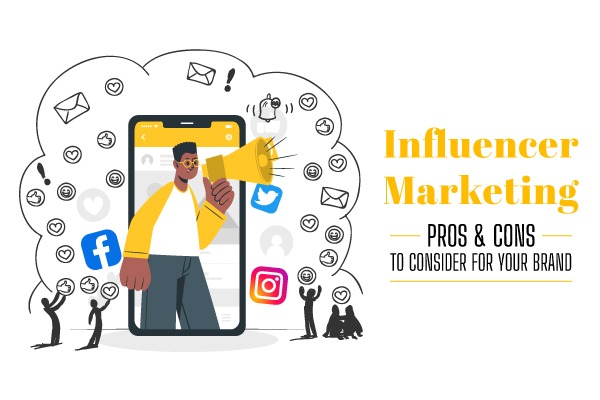

Influencer Marketing: Pros and cons to consider for your brand
Influencer marketing has taken a rise in recent past years as the need to tag big names grew more than the marketing budgets in the pockets.
But, little did we all know, that need had its own depth and roots when marketers discovered new grounds to tap with the macro & micro-influencers in their target market. Regional national and international brands; all went all-out in this game and pulled the influencer business to a peak.
But, the meaning of it is not going to benefit your business; its relevance truly will.
It is now safe to say that whatever kind of business you run; if that space has big names who all individually have their own set of cults following in your industry; they are an industry influencer and a pretty relevant influencer for your business, too.
But what about businesses that hire movie stars, TV stars, and famous sports personalities to make their point to the audience for them? Well, they are hired to spread the message as far and as impactful as possible. The relevance is not exactly on point, in this case, but the job and reach are automatically good, given the fan-following.
There are usually five aspects that decide the pros and cons of the influencer marketing approach of your brand.
Influencer marketing covers a lot of ground but the relevance of the influencer decides how your audience’s reach is important to you. You can hire influencers who are working for or associated with your competitor’s brand. This way you can be sure that the influencers’ reach is going to the relevant audience for your brand. Similarly, working for the wrong influencers can do more harm than good. It can create and pass on a different message for your brand and the audiences’ sentiments can get hurt badly.
Trust takes its own sweet time to develop. If an influencer talks positively about your brand; it helps the audience trust them and similarly the call to action becomes much more appealing in this case. But influencers can also hurt the brand’s trust and credibility generating factors by making simple mistakes like not disclosing that the post is sponsored, posting wrong content that doesn’t resonate with your brand, ignoring the FTC endorsement guidelines, and using bots to inflate engagement.
The cost to hire micro-influencers is always less than hiring a celebrity who is well known. But if you can’t measure the goals, you set out to achieve; all the efforts are in vain simultaneously.
Many of the influencer’s followers may end up buying the products much earlier without going into the usual AIDA phase, which reduces the sales cycle dramatically. But, to create impressive content for your brand if the relevance takes a hit in this equation, then all efforts are in vain for any marketer.
High risks are involved as you can hire too many influencers, but the results will still be immeasurable; the content execution is still going to be in the influencers’ hands and the relevance is still going to be in the grey if you are starting out fresh in the marketing field. It will save you time as the reach will be good and the sales figure might inflate for a while but can you elongate the campaign’s effect? is the right question to ask. So, summing up, influencer marketing has its pros and cons and can really overwhelm a noob marketer as well as a pro one in some cases. But, to miss out on the channel completely will be a big mistake. Draw your own parameters and put your own checks to analyze how the campaign is performing & how it is helping you make the sale etc which we call the campaign KPIs.
Also, if you need any help to plan a good full-fledged influencer marketing campaign for your brand, you know where to find us!